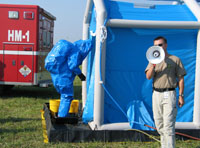Multi-Agency Exercise Helps State Prepare for Potential Agro-Terrorism
Multi-Agency Exercise Helps State Prepare for Potential Agro-Terrorism

Participants from emergency management, public health, law enforcement, animal health, and agriculture came together recently for a two-day preparedness exercise focusing on agro-terrorism.
Hosted by the Kentucky Office of Homeland Security, the first day’s program was in northern Kentucky, and on the second day participants gathered at the University of Kentucky’s Animal Research Center farm near Versailles.
"The UK College of Agriculture appreciates the efforts of Kentucky Homeland Security to demonstrate the devastating impact that terrorist acts could potentially have on our food system,” said Nancy Cox, associate dean for research in the UK College of Agriculture. “We’re honored to provide one of our Experiment Station research farms and staff support for the exercise."
The farm event, which allowed hazardous materials teams and other first responders to practice responding to a foreign disease outbreak in a local cattle herd, was pretend. But the rewards of the exercise were very real.
“There’s a huge value in this,” said Daniel Castle, Winchester fire chief and president of the Bluegrass Emergency Response Team. “When you start thinking about the different agencies – the emergency management, the police, the Army, the federal agencies – we don’t often get the chance to work together, and this gives us that chance.”
The first day was devoted to planning and preparing for response, and the second day’s farm exercise provided a demonstration of decontamination procedures and proper techniques for handling infected cattle.
“UK was great in getting alliances with the College of Agriculture and its Department of Animal and Food Sciences to have on-hand the people who know how to handle the cattle safely, and to have a practice exercise where people would have to put on the plastic boots, think about biosecurity, and then have an area here on the farm for emergency personnel to set up their demonstrations,” said veterinarian Roberta Dwyer, associate professor in UK’s Department of Veterinary Science and exercise planning committee member.
The exercise enabled people who may not be familiar with agriculture to see how biosecurity measures are implemented on the farm. Participants and news media alike had their vehicle tires sprayed with disinfectant as they arrived, and also had to wear disposable plastic boots. First responder team members put on special hazmat suits to demonstrate decontamination procedures.
One of several benefits was that the exercise allowed professionals from different agencies to meet one another and share ideas and information. Another benefit was the event serving as a possible preventative or deterrent.
“One of the main focuses we strive for is the concept that if we harden ourselves as a target by exercising and planning and participating, then the people who choose to negatively impact us will look for someplace else because they’ll say ‘those people know what they’re doing’ and it may preempt them,” said veterinarian Ed Hall, assistant director of animal health for the Kentucky Department of Agriculture.
More than 150 people representing more than 70 agencies participated in the two-day agro-terrorism preparedness exercise. The first day’s event was held at Northern Kentucky University’s Metropolitan Education Training Services Center in Erlanger.